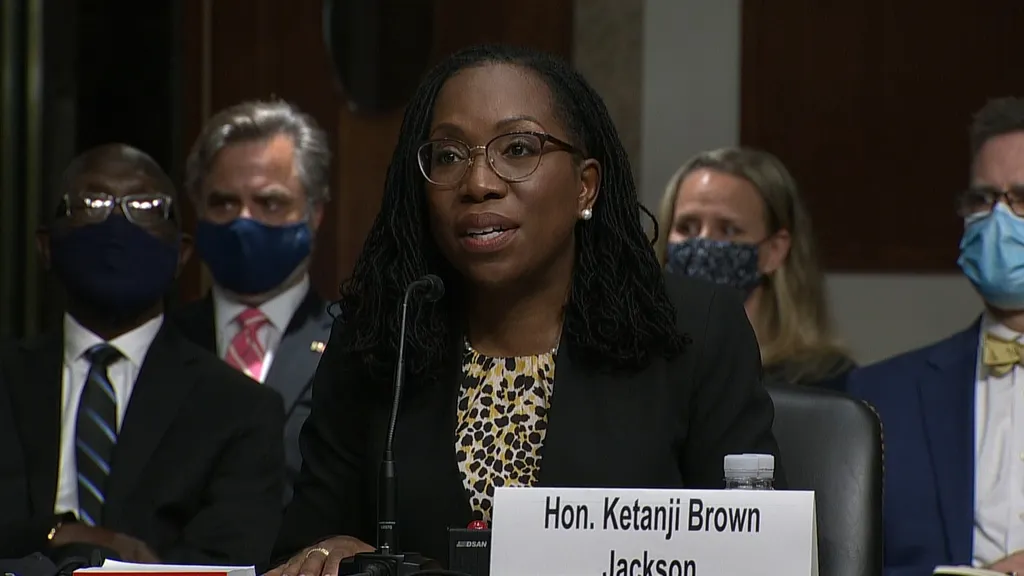By Morton A. Klein, ZOA National President
(March 14, 2022 / JNS) The most basic qualification for serving as a judge is to be impartial and free from bias. As such, a judge who harbors any antisemitic or racist views should surely not obtain a lifetime appointment to the U.S. Supreme Court. Moreover, in this era of alarming rising antisemitism, it is particularly critical for the Senate Judiciary Committee to assure that a judicial nominee has no hint of animus. It is thus incumbent upon the Senate Judiciary Committee to carefully question Supreme Court nominee Ketanji Brown Jackson about her attitudes and any involvement she may have had with the Harvard Black Students Association (BSA)’s invitation to antisemite, anti-white racist Leonard Jeffries to speak at Harvard University in 1991, while Ketanji Brown Jackson was a member of the Harvard BSA.
The judge should be given an opportunity to thoroughly and publicly denounce Jeffries’s absurd hateful views, and to answer questions along the following lines:
- Did Brown Jackson hold any office or position of influence in the Harvard BSA? Did she have any involvement with the Harvard BSA’s decision to invite Jeffries? If so, what was that involvement? Did she object to the BSA’s decision to invite him? If not, does she regret not speaking up? What is her opinion about the decision today? Did Brown Jackson attend Jeffries’ speech, and join in the BSA’s applause for Jeffries’ antisemitic and anti-white statements? Why or why not?
- What is the judge’s opinion about Jeffries’s absurd, false claims that “rich Jews” are responsible for the slave trade and that Jewish people are “skunks” who “stunk up everything”? What is her opinion about his denial that Jews were slaves in Egypt (which we commemorate annually on Passover)? What is her opinion about Jeffries’ absurd claims that African Americans are warm, humanistic “sun people,” while white Americans are cold, materialistic “ice people”? Is Judge Brown Jackson willing to publicly denounce Jeffries and his views?
- Does Brown Jackson believe that it was lawful for City University of New York (CUNY) to dismiss Jeffries from his position as chairman of CUNY’s Black Studies Department? What are the proper limits of “academic freedom”? Does she believe that a university has the legal right to dismiss a professor who expresses antisemitic or racist views?
We note that her excellent decision in favor of pro-Israel group Z Street, against the Obama administration’s discriminatory IRS, is an important indication that Judge Jackson Brown abides by her judicial oath to act impartially—Z Street v. Koskiken, 444 F.Supp.3d 48 (DDC 2014), upheld on appeal, 791 F.3d 24 (2015).
Z Street sued the Obama administration’s IRS for engaging in impermissible viewpoint discrimination against pro-Israel groups by implementing an internal IRS review policy that subjected Israel-related organizations applying for tax-exempt status to more rigorous review procedures than other organizations applying for the same tax-exempt status. Jackson Brown rejected the IRS’s assertions that the Anti-Injunction Act, the Declaratory Judgment Act and the sovereign immunity doctrine barred Z Street’s lawsuit, and permitted Z Street to press its constitutional claims against the IRS.
It is nonetheless important to examine every aspect of the judge’s background and views that may bear on her service on the nation’s highest court to assure Congress and the American people that there is no possibility of bias.
Morton A. Klein is the national president of the Zionist Organization of America (ZOA).
This article was originally published in JNS and can be viewed here.
